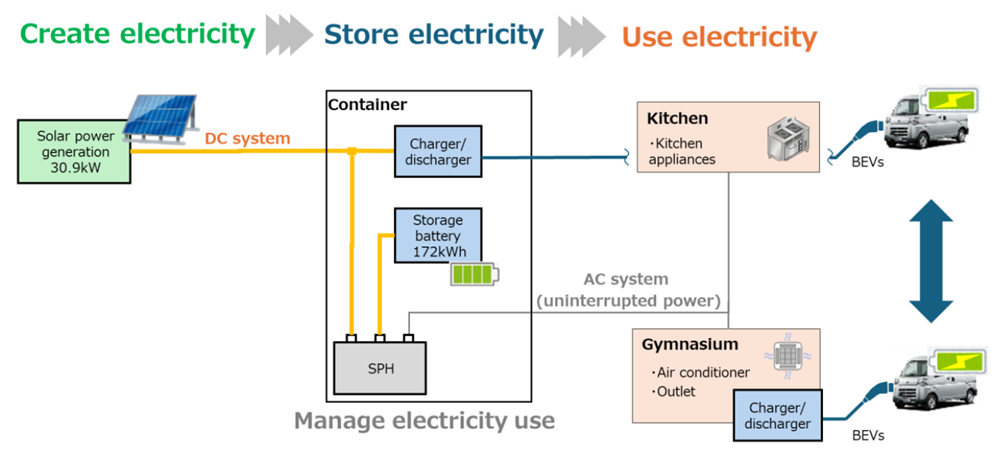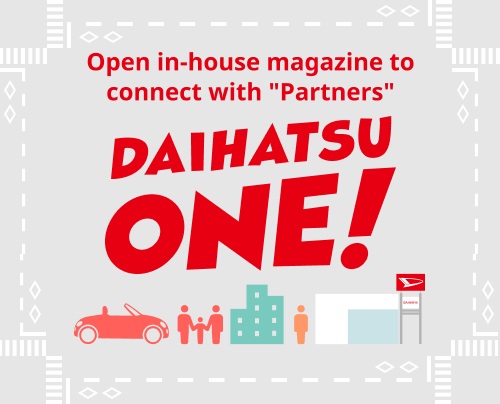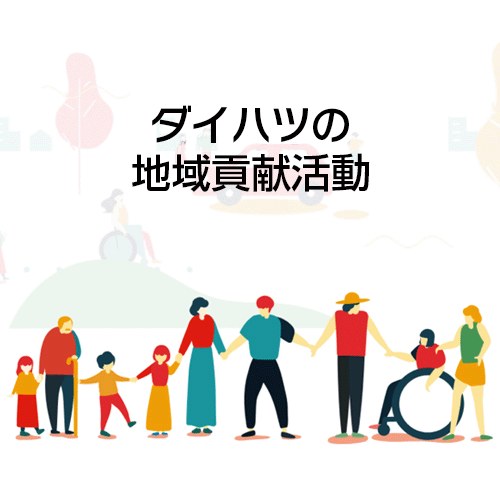- Company
- Management Policy & Strategy
- Technology
- NEWNov. 06, 2025
MAEDA and DAIHATSU to Begin Field-test for DC-Based Microgrid System Integrated into a Mobile Container
Nov. 06, 2025
MAEDA CORPORATION
DAIHATSU MOTOR CO., LTD.
MAEDA CORPORATION (Chiyoda Ward, Tokyo; President and Representative Director: Soji Maeda; hereinafter “MAEDA”) and DAIHATSU MOTOR CO., LTD. (Ikeda City, Osaka Prefecture; President: Masahiro Inoue; hereinafter “DAIHATSU”) will begin a two-year field-test in December 2025 for a multi-facility microgrid system at the ICI Center, MAEDA's innovation implementation facility in Toride City, Ibaraki Prefecture. A microgrid is a small-scale power network that supplies and manages electricity at the local level. It combines power generation facilities, such as solar power plants located near electricity consumption sites, with storage batteries and other equipment. This system consists of solar power generation, a Smart Power Hub (SPH®*1), a battery electric vehicle (BEV), and storage batteries. When in normal operation, it contributes to CO2 reduction by cutting peak power demand. When grid electricity is interrupted due to disasters, it supplies continuous electricity, enabling the continuation of public services and other essential functions.
In addition, the SPH and storage battery are compactly housed within the same container. This enables transportation to areas affected by disasters, where they can supply power using local renewable energy sources such as solar and wind power. Furthermore, by utilizing BEVs as mobile storage batteries, electricity can be shared between containers and multiple buildings. The data and knowledge gained through this experiment will form the foundation for developing an effective service.
【Background / History】
The effective use of renewable energy (hereinafter "renewables") toward achieving carbon neutrality (hereinafter "CN") by 2050, as well as Business Continuity Planning (BCP) in response to frequent natural disasters, have become essential.
MAEDA is working to achieve ZEB*2 and ZEH*3 standards in order to promote carbon neutrality throughout the entire lifecycle of public facilities and buildings such as residences, stores, and factories. To achieve this, it is actively introducing renewable energy. In addition, the gymnasium at ICI-Camp*4 within the ICI Center, which MAEDA operates, serves as a civic evacuation shelter under a disaster prevention agreement with Toride City. This requires electricity supply during power outages. Furthermore, during recovery operations in disaster-affected areas, MAEDA recognizes the need for mobile emergency power sources that can be easily connected to local renewable energy sources like solar and wind power.
Meanwhile, DAIHATSU is facing the urgent issue of both reducing CO2 emissions during vehicle operation through electrification and other measures, as well as decarbonizing its production and non-production areas, such as factories, logistics, and dealerships. DAIHATSU has been conducting research and development of microgrid systems that enable local production and consumption of energy to effectively utilize renewable energy. As part of this research, DAIHATSU was seeking a field-test site where the system's effectiveness and reliability could be verified.
MAEDA and DAIHATSU began collaborating in 2023 to address the above issues facing both companies.
The two companies have now decided to begin this field-test to achieve sustainable energy supply and BCP measures through the microgrid system.
【Features of the System】
◇ The features of the SPH 3-port power converter (connecting three directions: generation, storage, and usage) are as follows:
- It is the optimal solution for connecting to DC equipment like solar power generation, storage batteries, and BEVs. This significantly reduces the number of power conversion steps compared to AC-based microgrids, cutting energy loss by approximately 45%.
- It uses low-cost, high-efficiency power elements derived from inverter technology for hybrid systems, resulting in a simple and compact design.
- Its ultra-fast control ensures the continuous supply of electricity even during sudden voltage fluctuations, momentary power interruptions, and power outages.
◇ It can be transported to disaster areas or event venues by installing storage batteries and an SPH unit in a 20-foot container that can be towed by a truck. It can also be connected to solar power generation to provide a stable supply of electricity on-site.
◇ It can be integrated with DAIHATSU's Mini-Commercial Van Electric Vehicles(hereinafter "BEVs"), scheduled for introduction this fiscal year, to increase electricity storage capacity and enable electricity to be delivered during emergencies.
【Overview of Field-test】
At MAEDA's ICI-Camp, electricity generated by solar power is used to power the gymnasium and cafeteria, with surplus electricity stored in storage batteries and the batteries of BEVs.
During normal operation, the system connects to the kitchen, which experiences temporary daytime peaks in electricity demand, to verify CO2 reduction effects by leveling electricity consumption. At the same time, in anticipation of power outages due to disasters, it supplies continuous electricity to the gymnasium using solar power generation and storage batteries. This confirms that it can be used safely and with peace of mind as an evacuation shelter.
MAEDA and DAIHATSU will conduct a field-test for the microgrid system across multiple facilities with differing usage conditions. After confirming reliability, the 20-foot container will be physically relocated to verify electricity supply through connection with solar power generation and power sharing between multiple buildings using BEVs.
<System configuration for field-test>
【Future Developments】
Going forward, MAEDA and DAIHATSU will aim to implement this technology in public facilities to prepare for natural disasters, which are becoming increasingly severe each year. They will also identify needs for factories, data centers, medical facilities, nursing care facilities, and other locations where momentary power interruptions and power outages are unacceptable. Furthermore, through the integration of power infrastructure and mobility, they strive to protect and enrich life, especially in rural areas experiencing population decline. Therefore, MAEDA and DAIHATSU will continue to collaborate.
*1 SPH is a registered trademark of Toyota Central R&D Labs, Inc. It is a power converter jointly developed by Toyota Central R&D Labs, Inc. and DAIHATSU.
*2 ZEB is an abbreviation for Net Zero Energy Building. It is a building designed to achieve a net-zero annual primary energy consumption balance. This is accomplished by achieving energy savings through load reduction, utilization of natural energy, and high-efficiency equipment systems, while maintaining a comfortable indoor environment, and by introducing renewable energy sources.
*3 ZEH is an abbreviation for Net Zero Energy House. It is a house designed to achieve a net-zero annual primary energy consumption balance. This is accomplished by significantly improving the thermal insulation performance of the exterior structure, introducing high-efficiency equipment systems to achieve substantial energy savings while maintaining the quality of the indoor environment, and introducing renewable energy sources.
*4 ICI-Camp is located within the ICI Center operated by MAEDA. It is a training facility renovated from a closed elementary school in Toride City.





